Hiring great talent is one of the toughest challenges for startups. With limited resources and an urgent need to build a strong team, the process can be time-consuming. Sorting through resumes, managing interviews, and tracking candidates manually takes attention away from other priorities.
That’s where recruiting software comes in. The right tools help startups connect with qualified candidates faster while keeping the hiring process organized. But with so many options available, how do you find the most suitable recruitment software for your business?
This guide covers the top recruiting software for startups, important features to consider, and how to select the best option for your startup business.
What Is Recruitment Software?
Recruiting software simplifies the hiring process by organizing applications, automating communication, and helping recruiting teams connect with candidates faster.
Most recruiting tools include an applicant tracking system (ATS) to store resumes, track candidate progress, and filter applicants based on skills and experience.
AI-powered platforms go further by analyzing resumes, ranking top candidates, and predicting which hires will be the best fit. Some tools also integrate with job boards, social media, and email to reach a wider talent pool.
Startups that need to scale quickly benefit from reducing time spent on admin tasks and focusing on hiring the right people. Recruitment agencies and other hiring managers often rely on these tools to improve their recruitment process.
We’ve broken things down by category so you can choose which software is suitable for your hiring workflow.
Top Recruitment Software for Startups in 2025
Check out the top recruitment tools based on what they can offer to recruiting managers or agencies.
1. Village: Best for Warm Referral Hiring
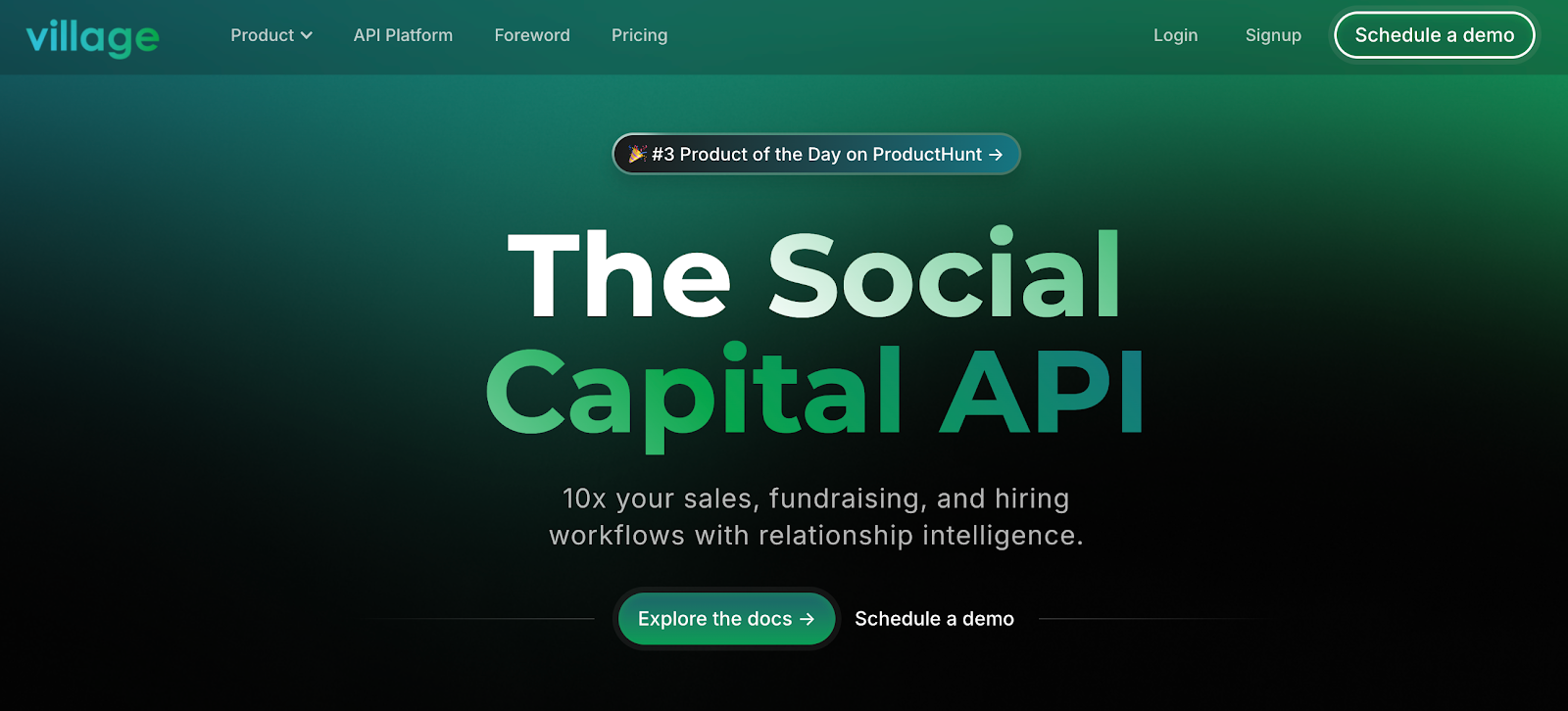
Job boards and cold outreach can help you cast a wide net, but that rarely connects you with people who truly fit the role. This is especially true for startups, where the best hires often come from referrals or warm connections.
Village helps you tap into those connections. It’s not a traditional recruiting tool. Instead, it’s a relationship intelligence platform that helps your team find talent through people you already know.
Features
Village syncs with LinkedIn, email, and calendars to surface first-, second-, and third-degree connections across your team. It shows you who’s in your extended network and who can introduce you to them.
With Village, your team can:
- Identify candidates they have worked with before.
- See who is best positioned to make a warm introduction.
- Map out talent based on shared history or mutual relationships.
- Focus on outreach that gets more replies.
Pricing
Village offers multiple pricing tiers:
- The Trial plan is free. It's a good starting point for startups that want to explore core features with limited AI searches before committing to a paid plan.
- The Essentials plan at $19 per month is well-suited for startups that occasionally make introductions and want access to investor networks, private boards, and unlimited AI searches.
- The Pro plan at $39 per month is ideal for startups with hiring teams that need collaboration tools and automated intro workflows to streamline recruitment.
- The Premium plan at $119 per month is best for startups actively expanding, fundraising, or scaling their hiring efforts. This plan includes extensive networking tools and API access for deeper integrations.
Try Village for free and see how it works!
2. Manatal: Best for Fast Role Matching
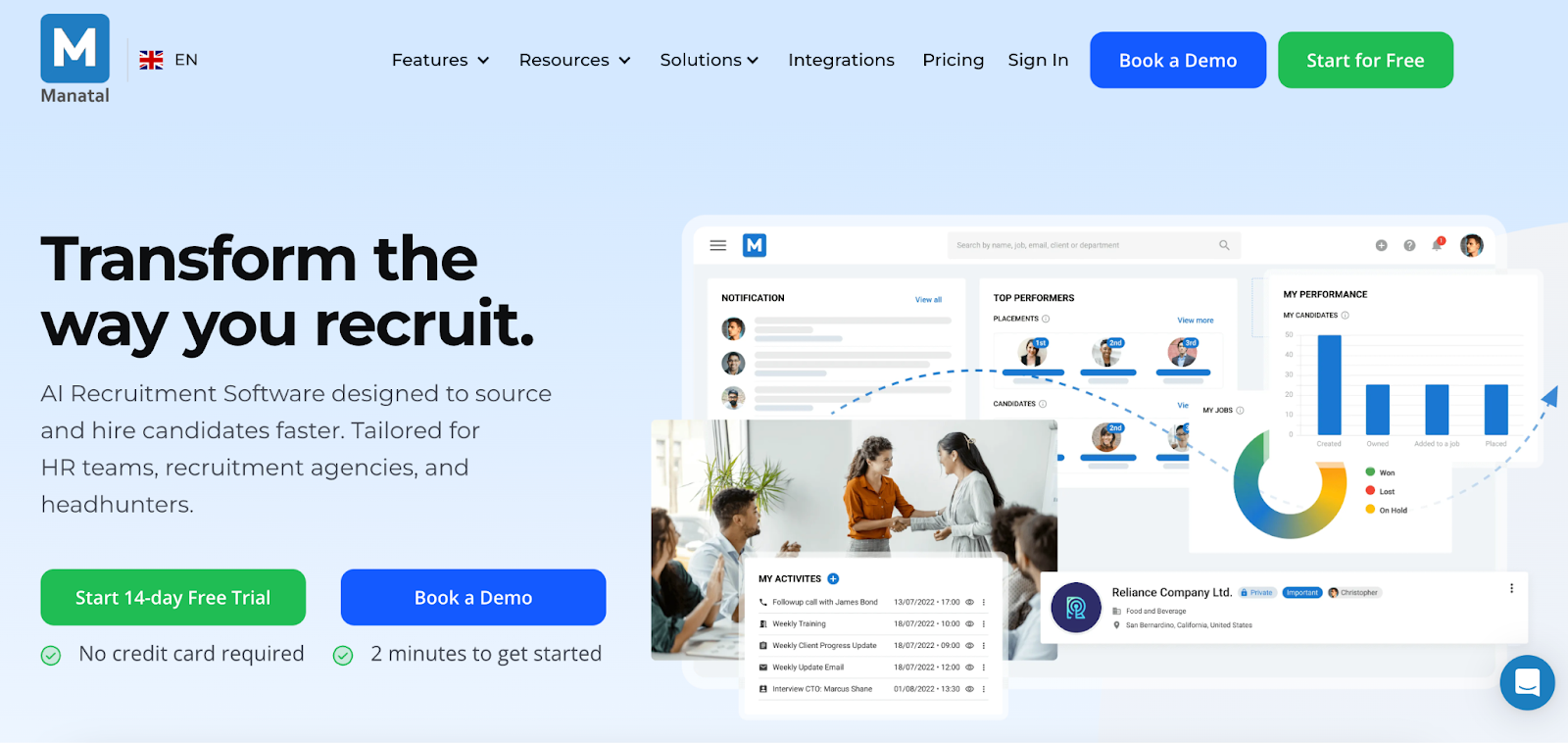
Manatal is built for in-house recruiting teams, staffing agencies, and headhunters. It offers an AI-powered job description generator, automatic candidate matching, and a structured database for tracking applicants. The software allows recruiters to import and organize data easily, making it a practical choice for startups that need to fill positions quickly.
Features
- AI-powered job description generator
- Automatic data parsing and candidate matching
- Supports both in-house and outsourced hiring
- Easy import of candidate data
Limitations
- No mobile app
- No self-scheduling tools for candidates
- Lacks text- or chat-based candidate engagement
Pricing
The Professional plan is priced at $19 per user per month, making it a suitable option for startups looking for a cost-effective recruitment solution. Higher plans range from $39 to $59 per user per month, with a custom pricing plan for custom integration.
3. Greenhouse: Best for Structured Hiring Workflows
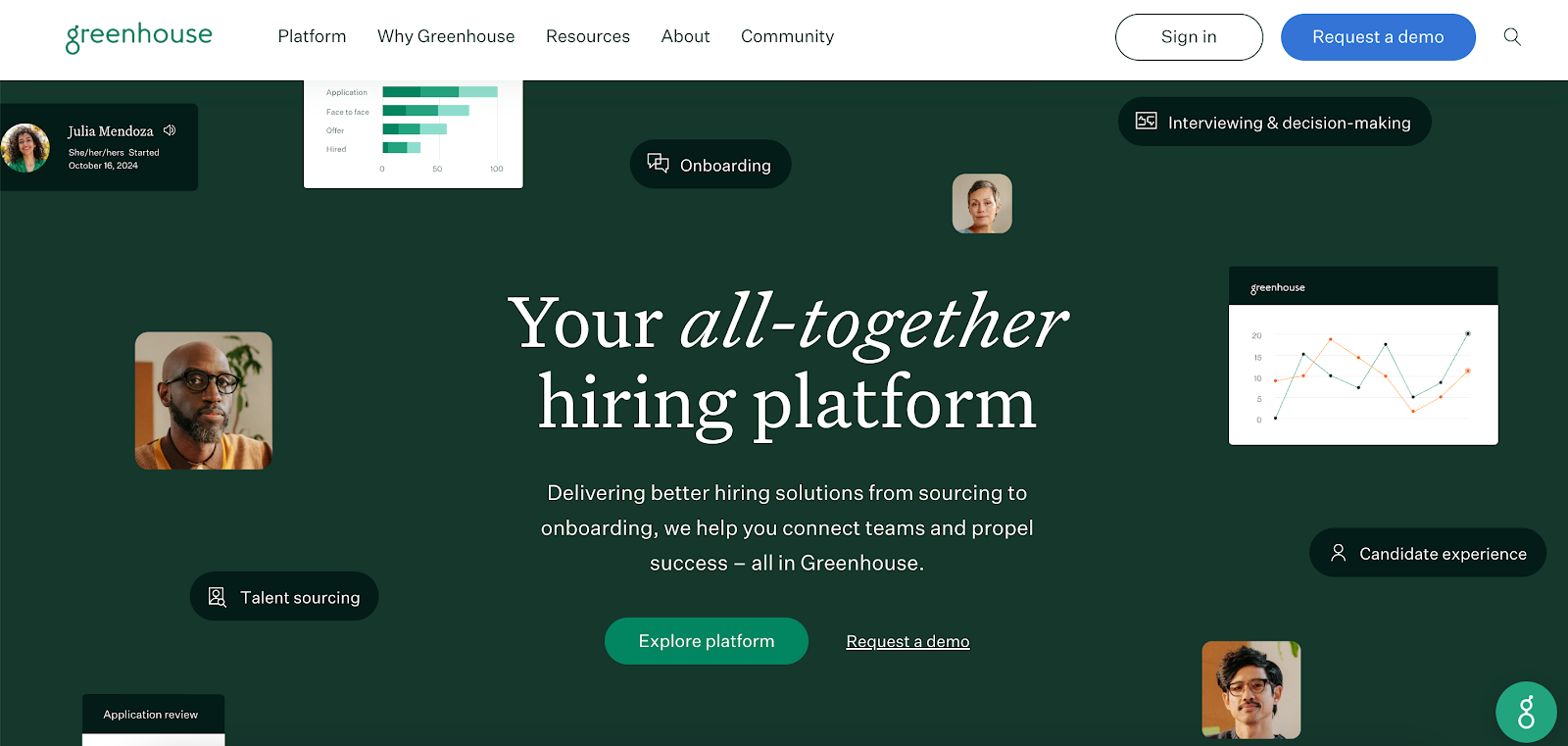
Greenhouse is a recruiting platform that covers the entire hiring process from sourcing to onboarding. It supports bulk outreach campaigns and integrates with over 1,000 job boards to expand candidate reach. The platform also allows teams to manage talent pools and track relationships with candidates over time.
Features
- Post jobs on 1,000+ job boards
- Bulk outreach campaigns with automated messaging
- Talent pools for long-term candidate tracking
- Text-based candidate engagement powered by Grayscale
- DE&I hiring tools to attract diverse talent
Limitations
- Reporting features are limited and difficult to customize
- Pricing is high and lacks flexibility
Pricing
Pricing details are not publicly available.
4. GoHire: Best for Job Board Visibility
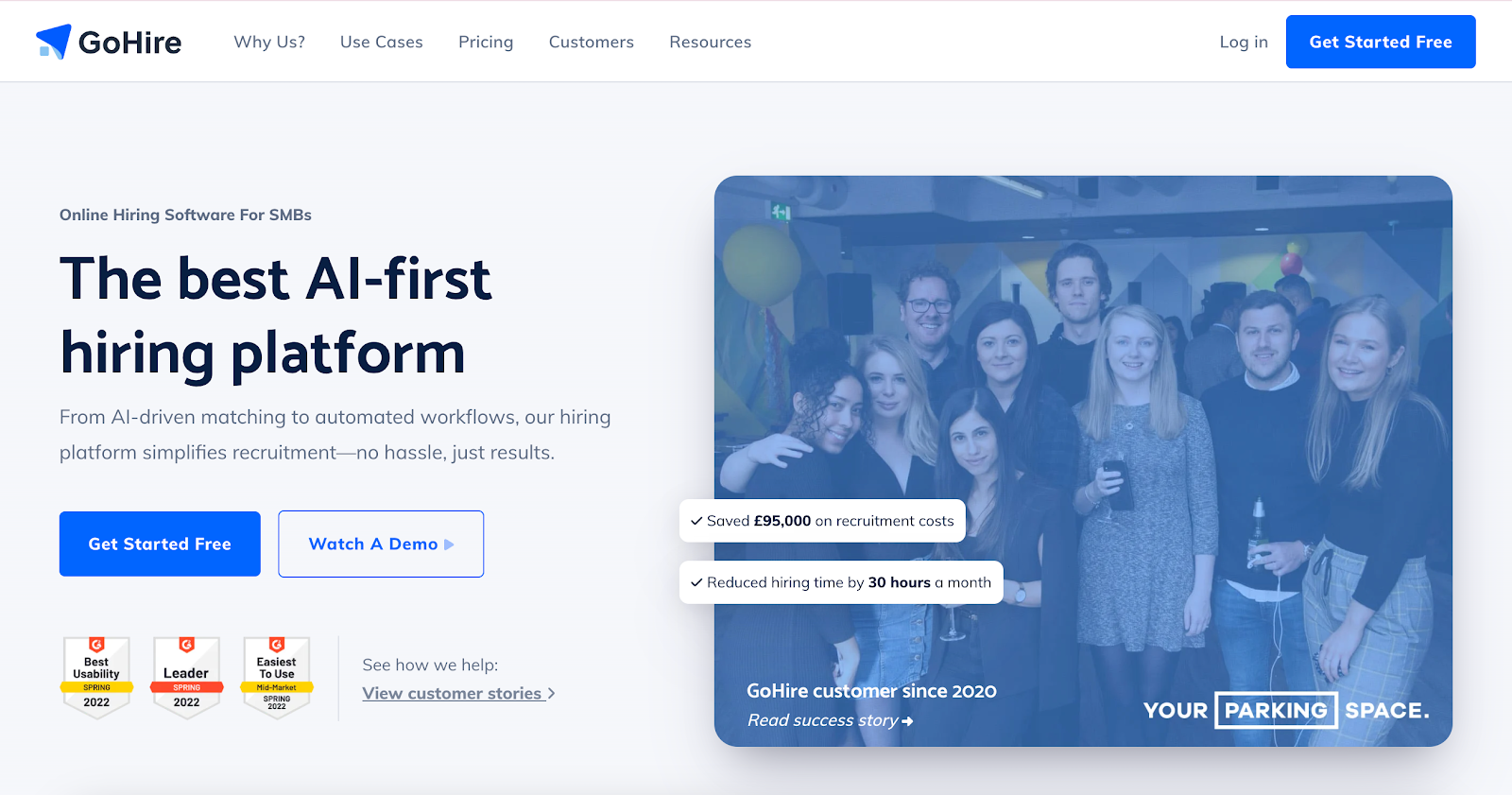
GoHire is a simple hiring platform built for startups and small businesses. It helps attract candidates, manage hiring workflows, and create branded career pages.
Job postings can be shared on major job boards like Indeed and LinkedIn, while automated scheduling tools help recruiters move candidates through the hiring process faster.
Features
- Job posting across major job boards like Indeed and LinkedIn
- Automated hiring workflows and interview self-scheduling
- Video questionnaires to assess candidates before interviews
- Employer branding tools to build strong career pages
Limitations
- Editing evaluation templates can be confusing
- No integration with classified job listings
- Requires deleting and redoing questions instead of allowing edits
Pricing
The Starter plan costs $99 per month, making it a reasonable choice for startups looking for recruitment software. GoHire also offers the Growth and Pro plans, priced at $199 and $299 per month.
5. Zoho Recruit: Best for Customer Relationship Management (CRM) and Applicant Tracking System
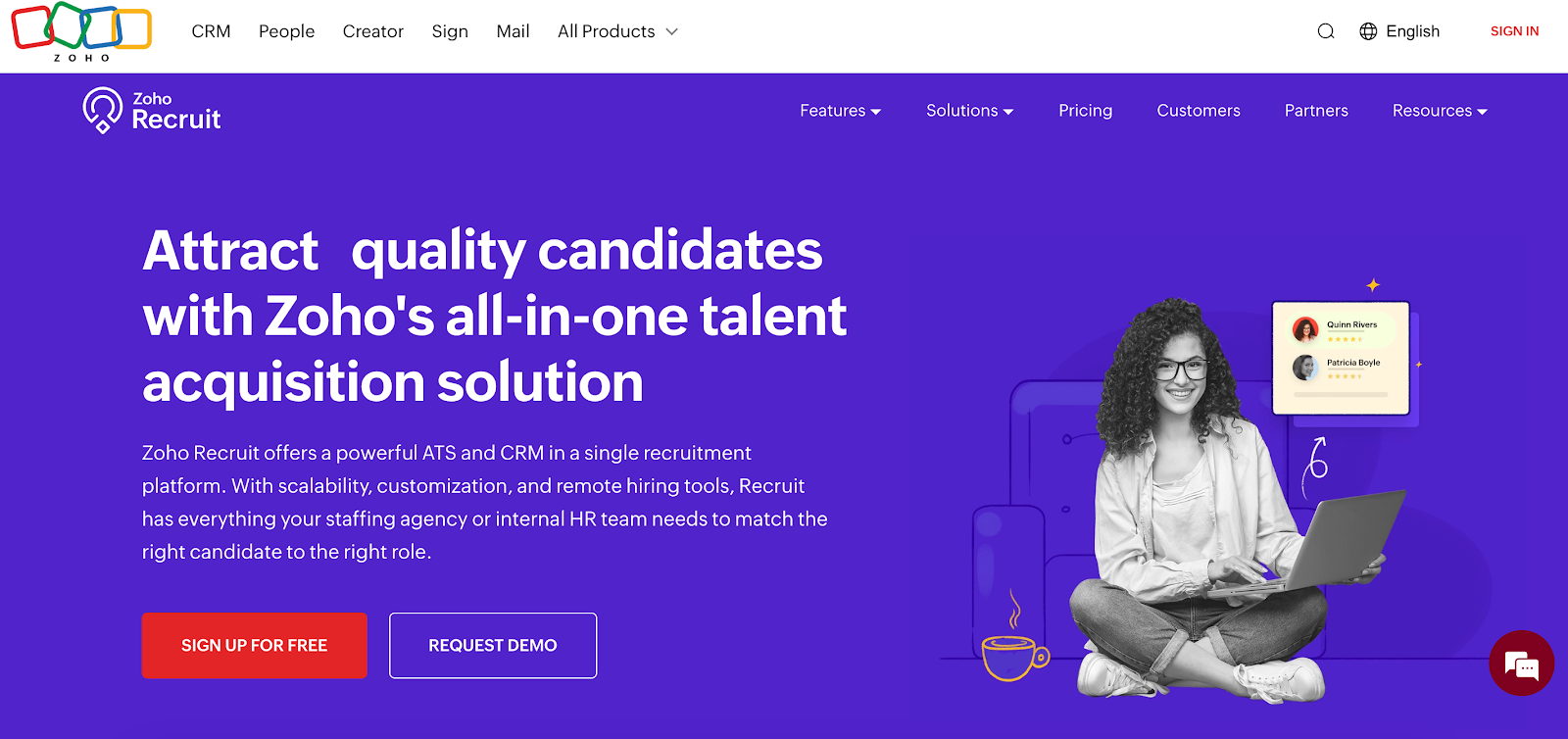
Zoho Recruit offers applicant tracking and a reliable recruit CRM in one platform. It allows recruiters to automate hiring workflows, track candidates across different stages, and post job openings to 75+ job boards with a single click. The software also offers talent analytics to help recruiters refine their hiring process.
Features
- Candidate tracking across all hiring stages
- Advanced analytics to refine recruitment strategies
- Automated hiring workflows to speed up the process
- Integration with social media for job sharing
Limitations
- Customer service is inconsistent
- Mobile app has performance issues
- No LinkedIn integration
Pricing
The Standard plan is priced at $30 per user per month, making it a suitable choice for startups that need an affordable ATS. The Professional and Enterprise plans are priced at $60 and $90 per month per user.
6. Recooty: Best for AI-Generated Job Descriptions
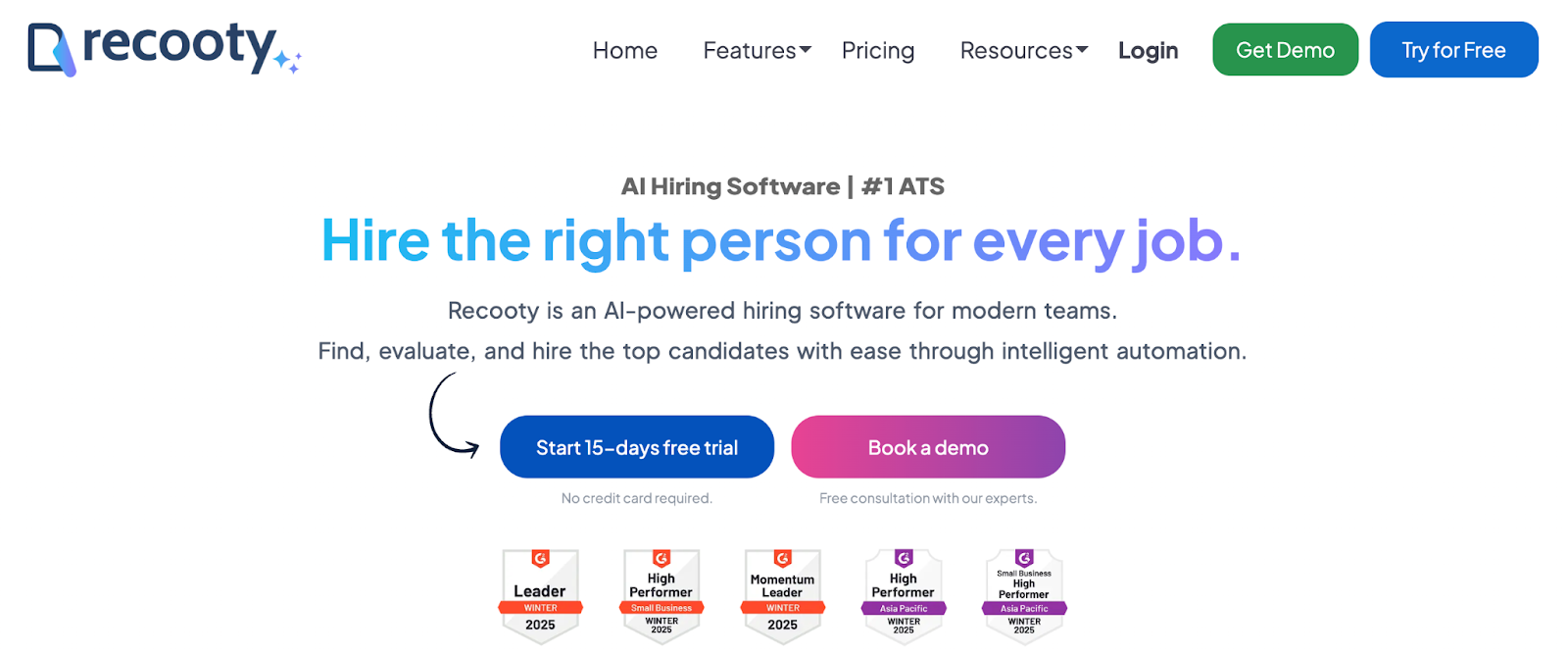
Recooty is an AI-powered hiring platform that helps modern teams find and hire the right candidates with speed and accuracy. Companies use Recooty to optimize every stage of their hiring process. The platform uses intelligent automation to simplify job posting, streamline candidate evaluations, and improve hiring decisions.
Features
- Access 700+ AI-generated job descriptions to simplify job posting.
- Use AI to match candidates and score resumes for better screening.
- Distribute job posts across job boards, social media, and your website.
- Schedule interviews using Gmail and Outlook calendar integration.
- Filter candidates with knockout questions and manage pipeline stages.
Limitations
- Lacks some integrations with third-party software
- Candidate capacity is limited on lower-tier plans
- Advanced tools like custom reporting require an enterprise plan
Pricing
Recooty’s Starter plan costs $99 per month and is suitable for occasional hiring at startups or small teams that need up to five job slots and core AI-powered recruiting features. They also offer the Standard plan, billed at $199 per month.
7. Workable: Best for Team-Based Hiring
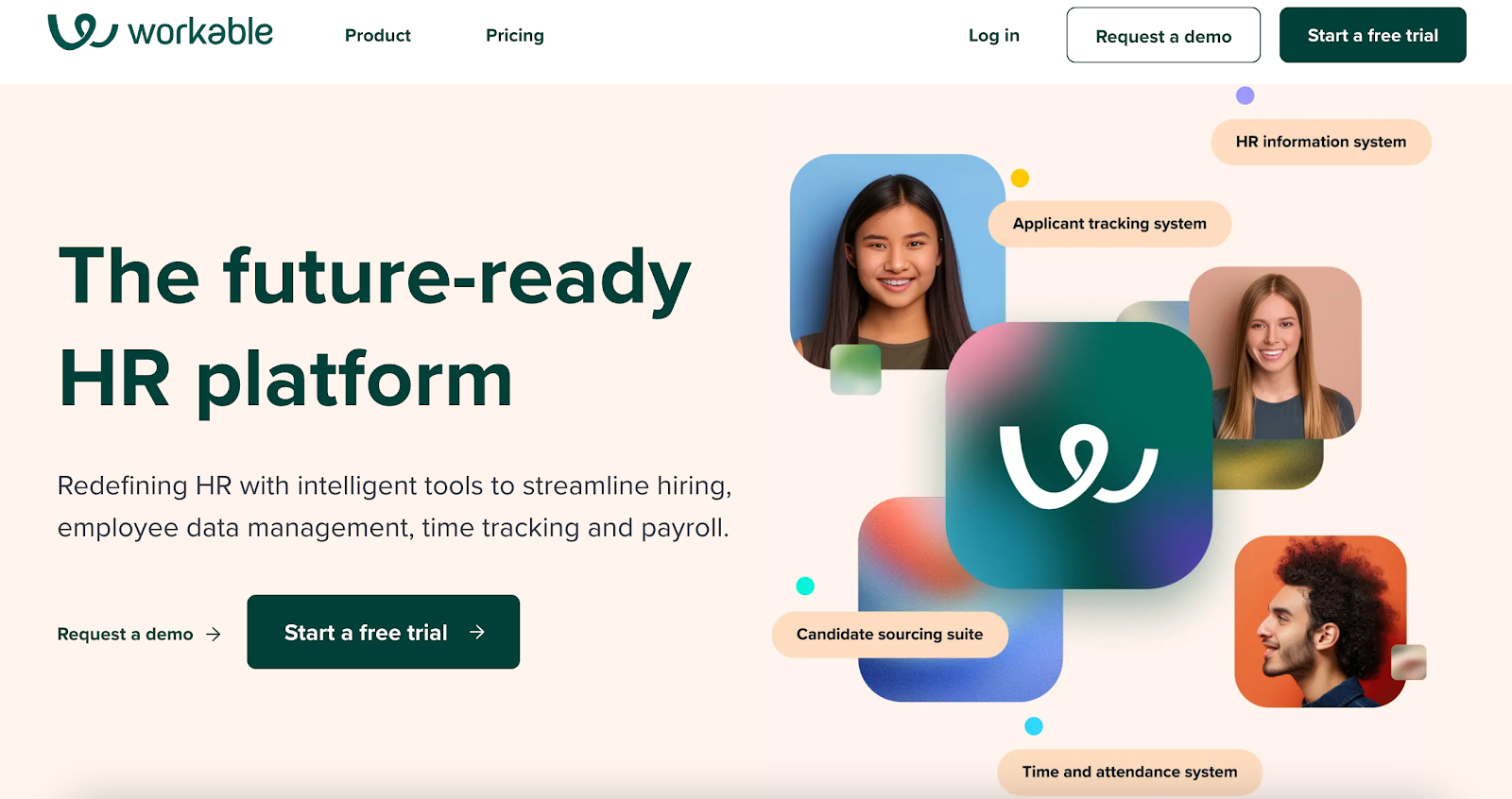
Workable is an AI-powered recruiting platform that helps startups find and hire candidates faster. It offers access to a database of over 400 million profiles and provides automated recommendations for job openings.
The platform includes applicant tracking, interview scheduling, and team collaboration tools to help keep hiring organized.
Features
- AI-powered screening
- Mobile app for hiring on the go
- Automated applicant tracking and interview scheduling
- Candidate database management for tracking past applicants
- Collaboration tools for hiring teams
Limitations
- Archived positions must be unarchived to access data
- Customer support has received complaints about contract policies
- Mobile site is not user-friendly
Pricing
The Starter plan costs $249 per month and is suited for startups with up to 20 employees. They also provide the Standard and Premier plans, which cost $420 and $679 per month, respectively.
8. Breezy HR: Best for Automation Across Hiring Stages
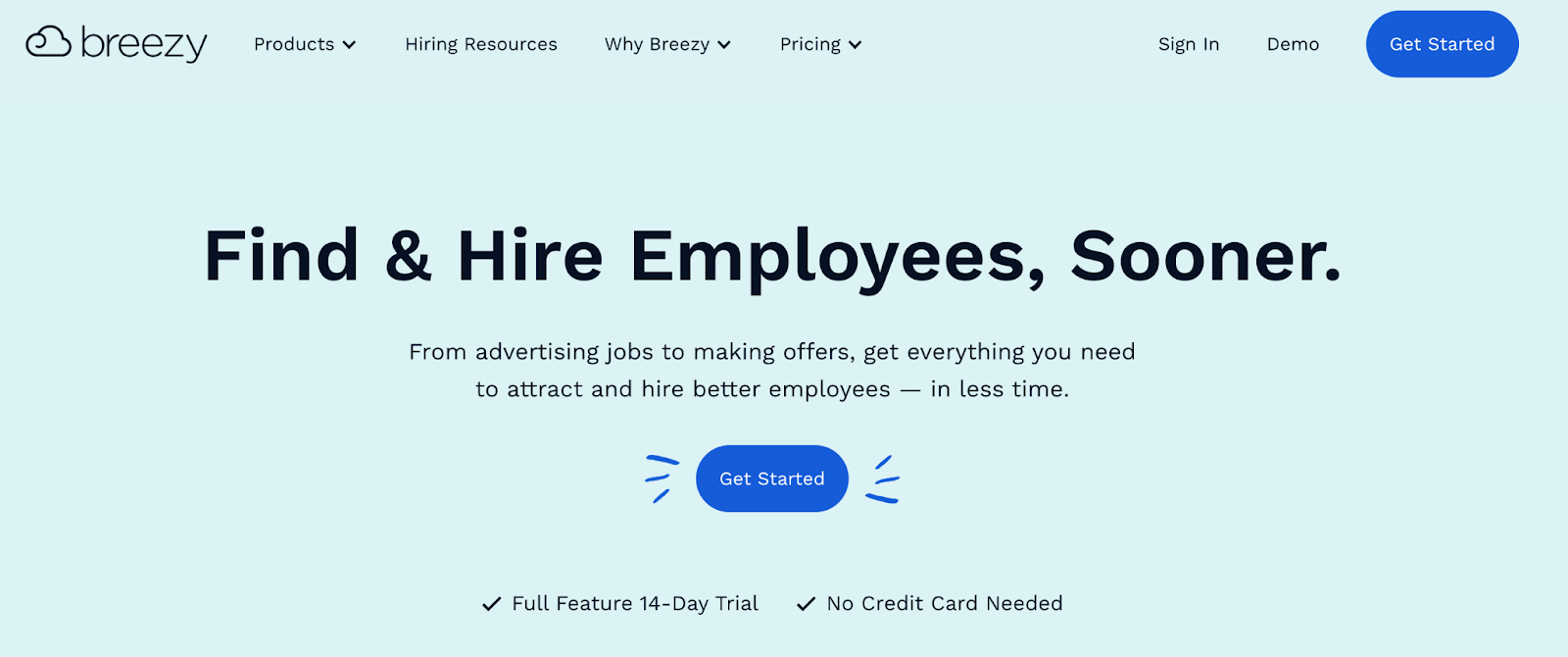
Breezy HR helps startups find, evaluate, and hire candidates while removing repetitive work from the process. You can post jobs to more than 50 sites with one click, create a branded careers page, and automate everything from email follow-ups to interview scheduling.
The platform supports every stage of hiring, from attracting applicants to sending offer letters.
Features
- Post jobs to 50+ job boards with one click
- Build a branded careers page
- Automate pre-screening, messaging, and interview scheduling
- Use scorecards and team feedback to evaluate candidates
- Manage offers and connect to HR systems to finalize hires
Limitations
- Reporting in the lower-tier plan has limited flexibility
- Interface may feel too simple for teams with complex workflows
- Learning curve exists for setting up advanced automation
Pricing
Breezy HR offers a free plan for one position. After that, there are three paid plans that range from $189 to $529 per month.
Key Features of Recruiting Software for Startups
Hiring the right people quickly is a challenge for startups. Sorting through resumes, managing applications, and scheduling interviews takes time that could be spent growing the business. The best recruiting software automates hiring tasks, improves collaboration, and helps businesses connect with top talent faster.
Essential Features
These are the core features every startup should prioritize when choosing recruiting software:
- An applicant tracking system stores applications, tracks progress, and organizes candidate data in one place.
- Resume screening and AI-powered matching filter applicants based on skills and experience, ranking the best-fit candidates.
- Automated interview scheduling syncs with calendars to reduce scheduling conflicts and speed up the hiring process.
- Collaboration tools allow hiring teams to leave feedback, share notes, and work together on hiring decisions.
Advanced Features
Beyond the basics, some recruiting tools offer additional features that help refine the hiring process:
- Recruitment marketing and employer branding promote job openings across multiple platforms to attract more candidates.
- Predictive analytics and reporting analyze hiring trends, job post-performance, and recruiter efficiency.
- Customizable workflows and pipelines adapt to a startup’s unique hiring process.
- Integration with human resources (HR) and productivity tools connects with payroll, communication platforms, and existing software for a smoother experience.
Recruiting software with these features reduces manual work and speeds up hiring decisions.
How to Choose the Right Recruiting Software for Your Startup
Startups should evaluate whether they need basic features like an ATS or advanced options such as AI-powered matching and detailed reports on candidate performance. Hiring HR managers and recruiters should also consider integration capabilities and pricing models when making a decision.
The first step is assessing your hiring process. A startup hiring its first employees may need a simple ATS, while a growing team might benefit from AI-driven candidate matching and analytics.
Understanding how many roles need to be filled and what level of automation is required helps filter out tools that don’t align with your strategy.
Compare Features and Pricing
Some recruitment software focuses on applicant tracking, while others emphasize AI-powered recruiting, automation, or integrations with HR tools. Comparing features side by side ensures the platform supports hiring goals without unnecessary extras that drive up costs.
Pricing models vary widely. Some platforms charge per job post, while others have monthly or annual subscriptions based on company size. Startups should balance affordability with functionality, avoiding overly complex systems that slow down hiring instead of improving it.
Look for Integration and Usability
Recruiting software should fit into daily operations without causing disruptions. Platforms that integrate with existing HR tools, calendars, and communication apps prevent bottlenecks and reduce extra manual work.
Usability is equally important. A cluttered or confusing interface can slow down the hiring process. Testing demos or free trials helps determine if the platform is intuitive for recruiters, hiring managers, and applicants.
Test the Recruitment Software
Reading reviews and requesting demos provides insight into how well a platform works in real-world hiring scenarios. Feedback from other startups can highlight potential drawbacks, while hands-on testing reveals whether the software aligns with your hiring strategy.
The Role of Data Migration in Recruiting Software
Switching to new recruiting software means transferring existing candidate data. Resumes, hiring history, and interview notes need to move over without errors or missing information. Losing this data can disrupt hiring and create extra work for recruiters.
Most platforms offer migration tools to transfer records from spreadsheets or previous systems. Some also provide support teams to handle the process. Before switching, it’s important to confirm what data can be moved, how long it will take, and whether manual adjustments will be needed.
A smooth migration keeps hiring teams on track by maintaining access to past applications and progress updates. Planning prevents delays and ensures that no valuable information is lost.
How to Implement Recruiting Software for Your Startup
Switching to recruiting software should improve hiring, not create confusion. A rushed setup can lead to missed applications, scattered communication, and slow decision-making. Taking the time to introduce the platform step by step helps teams adjust without disrupting hiring efforts.
Rolling out the software in phases makes the transition easier. Starting with job posting and applicant tracking before introducing automation tools helps hiring teams get comfortable. Testing the system with a small batch of hires first can reveal any adjustments needed before fully adopting it.
Training is just as important as the software itself. Hiring managers and recruiters should know how to track applicants, schedule interviews, and automate repetitive tasks.
Many platforms offer tutorials or customer support to help teams learn the system. Keeping communication open within the team also helps address challenges early and keeps hiring on track.
Connect With the Best Candidates Using Village
Hiring delays cost startups time and strong candidates. Slow application processes, unorganized tracking, and back-and-forth scheduling push top talent toward other opportunities.
Recruitment software helps speed up hiring by automating tasks, ranking candidates based on experience, and keeping hiring teams informed.
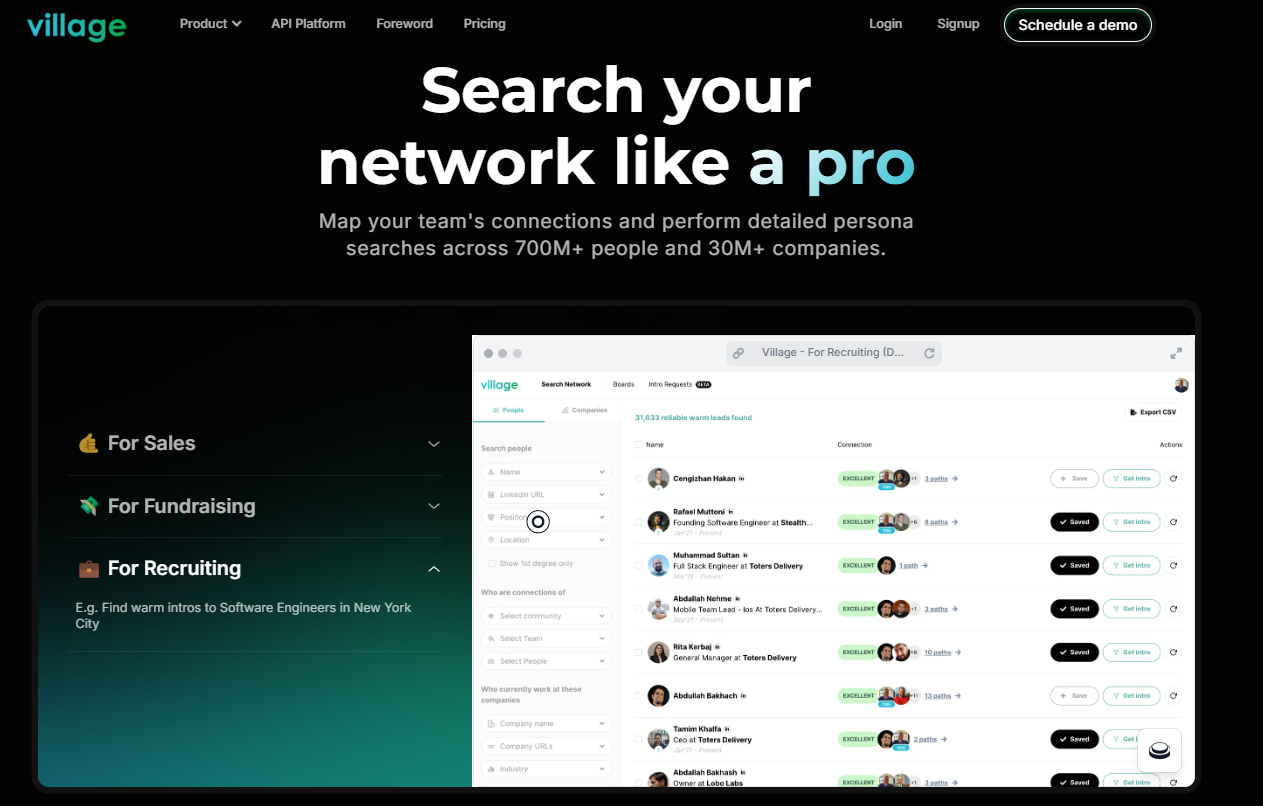
Referrals also help startups move faster by connecting with qualified candidates through trusted networks. Village makes this easier by tapping into existing connections, turning warm introductions into hiring opportunities.
Instead of relying on cold outreach or job boards, recruiters can reach top talent through people they already know.
Get started with Village today and build a faster, more effective hiring process.
FAQs About Recruiting Software for Startups
What is the best software for recruitment?
The best recruiting software depends on how a startup approaches hiring. Village helps businesses connect with strong candidates through warm introductions, reducing reliance on cold outreach and job boards.
Other platforms focus on applicant tracking, AI-powered matching, or workflow automation, but they don’t offer the same network-driven approach that Village provides.
Which CRM is best for recruitment?
A recruitment-focused customer relationship management (CRM) should help organize candidate relationships and track communication effectively. Village allows startups to build hiring pipelines based on real connections, making it easier to engage with top talent.
Platforms that focus on database management and hiring workflows may suit businesses looking for a more structured tracking system.
Which platform is best for recruitment?
Job postings attract a large number of applicants, but volume doesn’t always mean quality. Village helps startups connect with candidates through trusted networks, leading to stronger hires. Some platforms also offer job board integrations, but these tools often require filtering through unqualified applicants before finding the right fit.









